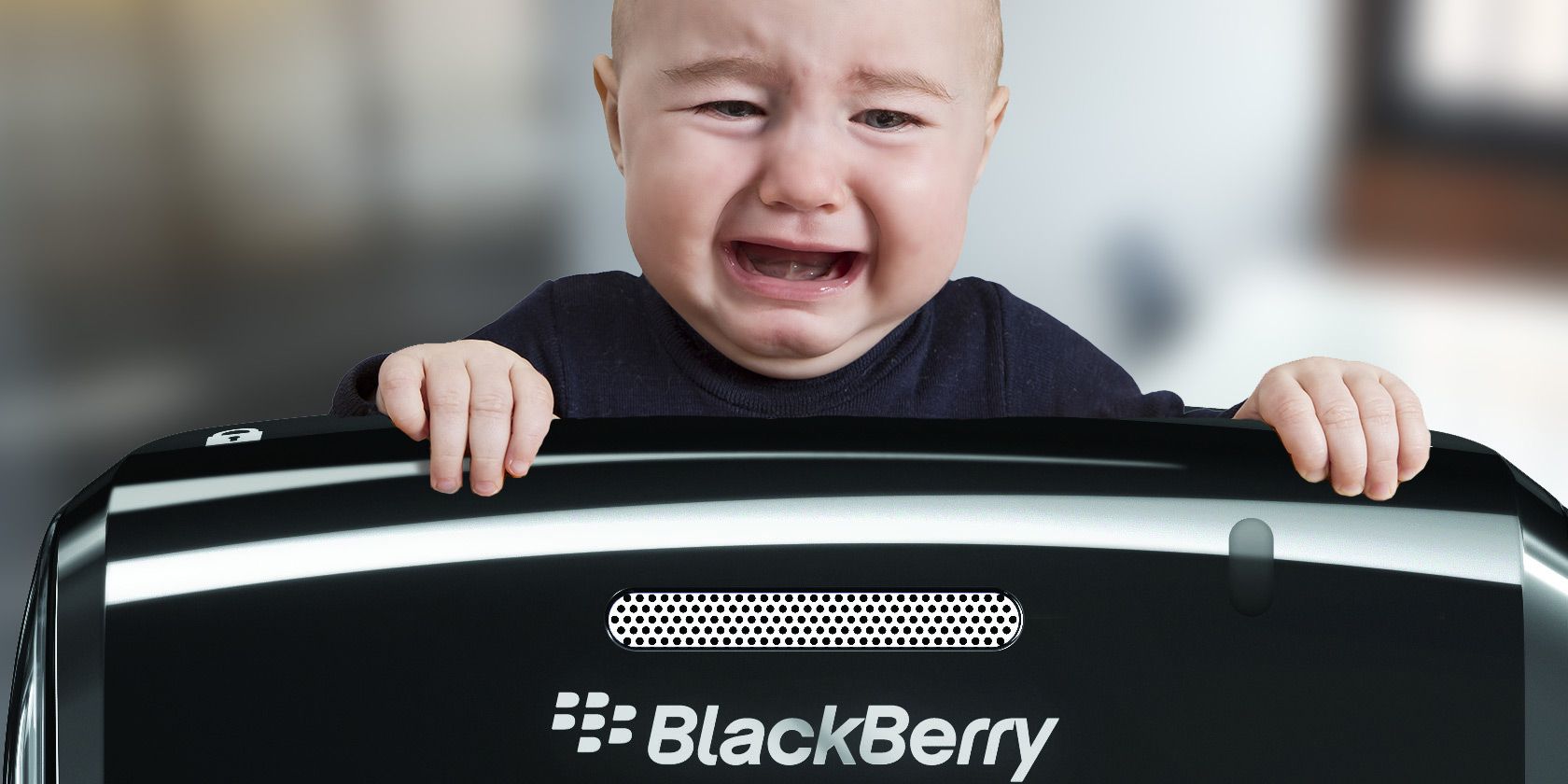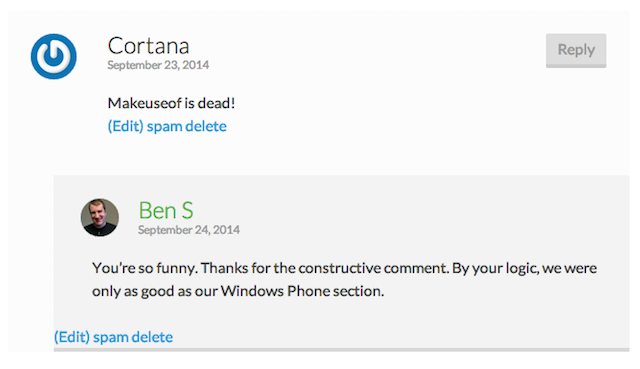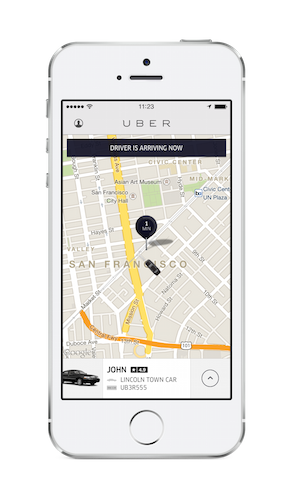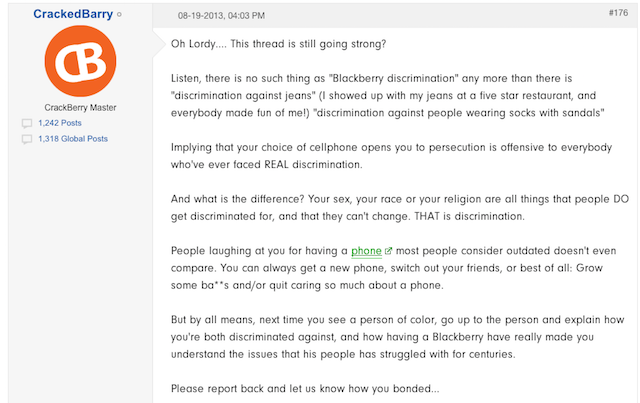Last week, Blackberry CEO John Chen wrote an op-ed on the future of net neutrality. It got...weird.
".. if we truly want a free, open and non-discriminatory internet. All wireless broadband customers must have the ability to access any lawful applications and content they choose, and applications/content providers must be prohibited from discriminating based on the customer’s mobile operating system.
Discrimination, John Chen? I'm a longtime Blackberry user who loves the platform, but this is just ridiculous.
Discrimination is a word with a very specific meaning, and is generally understood to mean exclusion or ill-treatment of a protected group. In the majority of the West, this generally means gender, sexual orientation, color, disability, veteran status or gender identity. If you deny someone a job, or service in a place of business, as a result of one of those attributes, you will find yourself before a judge in next to no time.
Seemingly, the CEO of Blackberry would also add users of third-tier smartphone platforms to that list, as he openly stated he would like to see developers be legally compelled to make Blackberry apps.
Chen's astonishingly tone-deaf lack of self-awareness aside, does his argument have any credence? Is he alone in wanting coders to take a more egalitarian and inclusive approach to app development, or else?
Help! Help! I'm Being Oppressed!
Of course, John Chen isn't the only person in tech who has compared the plight of their chosen platform to the D word. Let's face it: geeks are an evangelical bunch, many of whom are deeply passionate about their chosen smartphone platform. When fellow MakeUseOf writer Ben Stegner wrote a piece announcing our decision to stop writing about Windows Phone, he ended up dealing with 400 angry commenters. It was like he'd kicked a wasps nest, where all the wasps have crap phones.
It's easy to see how smartphone use has taken a near-religious slant. Many of us pin our identity on being Android, Blackberry, or iOS users – in a way people used to identify as Mac or PC users. Far too many people get their tech news in platform-exclusive echo chambers, where their decision to use their chosen platform is constantly reinforced as the right one, whilst the decision to use a different platform is seen as fundamentally misguided.
As a result, it's easy to see why people can get offended when their chosen platform is slighted.
But is the lack of an Uber app for Blackberry 10, or the lack of iMessage for Windows Phone, really discrimination?
Jim Szymanski, writing for Mobility Digest, thinks so. In a piece titled 'Is Windows Phone being discriminated against?' he started off by saying 'Being a Christian, Caucasian, American male, I have not dealt directly with discrimination in most any facet of my life.'
There's a 'but' coming, isn't there?
While I don’t want to accuse the corporate world of intentionally discriminating against Windows Phone, I would suggest that neglecting the platform shows some insensitivity to a good number of their customers.
Insensitivity! Neglect! Intentional discrimination!
Thankfully, Jim has a suggestion for how to make things better.
The next time you send a snailmail letter or email to a corporate entity asking why they don’t offer a Windows Phone app, make sure you drop in the “D” words, discrimination and diversity. ... Most likely, the emails will be flagged to go to the Director of Diversity Services, and who knows what may happen.
Who, indeed, knows what will happen? If I had to hazard a guess, I'd say your email will be printed out and stuck on the office notice board, so everyone can have a good laugh.
It's not just Windows Phone users who feel downtrodden. Some posters on the Crackberry forum (the largest Blackberry forum in the world, with over ten users) feel particularly hard done by. One such poster, STV0726, has taken to the forum to defend why he uses the term 'Blackberry Discrimination'.
BlackBerry market share in the US is almost the same as Windows Phone (within a percentage point and a half), yet BlackBerry gets almost all the severely negatively biased press, and nearly all of the point-of-sale bashing. BlackBerry discrimination is a REAL thing. And if you think I'm joking, I encourage you to take a good, hard look around.
Of course, to the credit of the Crackberry community, most pointed out that the discrimination of not having the latest Angry Birds game isn't quite the same as not being let into a shop because of the color of your skin. User CrackedBarry responded:
Implying that your choice of cellphone opens you to persecution is offensive to everybody who've ever faced REAL discrimination.
Quite.
What Do Developers Say?
It's easy to get sucked into the highly emotive facet of this debate. Whether the decision to not write apps for Windows Phone is or isn't discrimination (it isn't), there remain a number of practical considerations that make it unfeasible for developers to release apps for every platform. As a result, most developers I've spoken to are highly critical of John Chen's remarks.
First up is Tom Willoughby, a Cornwall-based independent app developer.
It is entirely preposterous to say that it is 'discrimination' to not develop apps for the Blackberry. The fact is, Blackberry has a very small market share, and most small apps wouldn't be able to recoup development costs if they were released on the platform. That would mean that developers are working at a loss to benefit Blackberry. If the platform was better, it would naturally attract more users, and developers would have an incentive to make Blackberry apps.
It's a good point. If Blackberry wants developers to release applications for their platform, they should ensure that development costs are recouped. This shouldn't be a wild concept for Blackberry. They did just that in the months leading up to the release of Blackberry 10, where they offered developers a $10,000 incentive to build apps for their (then unreleased) latest operating system.
Seattle-based developer Brian Wisti was also skeptical of Chen's thoughts, but purely from a legislative point of view.
He's arguing for open platforms. I think that's great. He uses clumsy phrasing, but that's what it sounds like. I think there's no reason for Netflix to use its resources developing for the Blackberry platform, but it would be great if they could partner with developers who did have the resources and expertise. Even better would be an API which would allow independent developers to make those services available on their preferred platforms.
I think muddling net neutrality with open platforms is a bad idea. Net Neutrality is already vague enough, but at least we know it has something to do with allowing equal access to network bandwidth for both large and small services. Service availability has many more variables than bandwidth availability.
I love the idea of nondiscriminatory service practices, but I doubt it could be enforced. Legislating service availability for all device platforms creates a legal headache. It becomes too easy for somebody to create their own Tizen fork with a few key differences, and then attempt to tie Netflix up in court for not supporting their deliberately broken fork.
Again, I'm inclined to agree with the developer here. There are countless historical examples of Governments making well-meaning attempts to legislate the Internet, and getting it horribly wrong. For example: the South Korean government mandated that all citizens use 'digital certificates' for online shopping. These certificates would be impossible to forge, and would help mitigate against identity theft. The only downside? The certificates depended upon the notoriously-insecure Active X, which only works with Internet Explorer. As a result, South Korea has one of the highest levels of Internet Explorer use worldwide.
Are Mobile Users Being Discriminated Against?
Are there fewer applications and accessories available for Blackberry 10, Windows Phone, and Firefox OS devices? Absolutely. But that's not discrimination. That's merely a byproduct of the free market, and the anemic demand for applications and accessories for Blackberry 10, Windows Phone, and FireFox OS, in relation to Android and iOS.
Are people being refused entry into restaurants for owning a Lumia? Do people get attacked for loving a physical keyboard? Absolutely not.
Google Glass, on the other hand...
Image Credits: Crying young child Via Shutterstock




